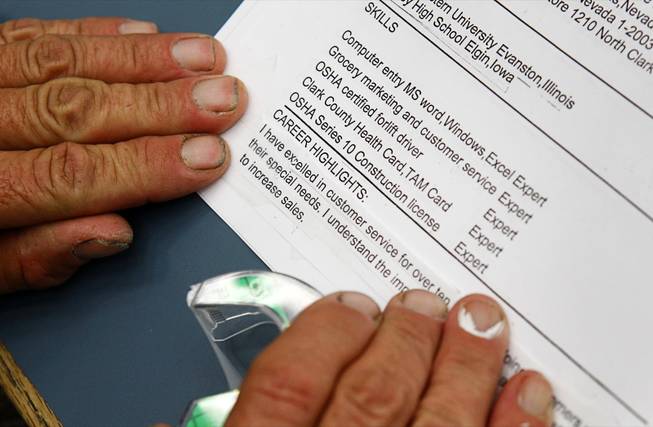
A man fills out paperwork at the Job Connect offices on Maryland Parkway Tuesday, March 27, 2012.
Thursday, Dec. 20, 2012 | 2 a.m.
Related stories
- Boehner pitches Republicans tax options to avoid ‘fiscal cliff’ (12-18-2012)
- Narrow ‘fiscal cliff’ bargain gains currency (12-18-2012)
- Congress may work through holidays to avert ‘fiscal cliff’ (12-17-2012)
- As fiscal cliff nears, Reid says Democrats are gaining ground (12-13-2012)
- Night talks: Obama, Boehner meet on ‘fiscal cliff’ (12-13-2012)
- More Sun political news
Obama, Boehner riding out ‘fiscal cliff’ negotiations, but Harry Reid may control the wheel (12-19-2012)
If there’s no deal on the fiscal cliff, it isn’t just working Nevadans who will need to worry about a hit to the pocketbook.
Unemployed Nevadans also will have to brace themselves for the chance they could lose their emergency benefits.
Though the "fiscal cliff" discussion has focused on tax rates and sequestration, unemployment insurance could be on the chopping block as lawmakers work out what tax programs will be extended and what spending programs will be scaled back to keep the economy from contracting.
Emergency unemployment benefits were last extended at the end of 2011, along with an extension of payroll tax cuts that lowered the amount workers paid into the Social Security coffers from 6.2 percent to 4.2 percent.
Now those two program extensions are set to expire at year’s end along with the latest extension of income tax rate cuts, just as across-the-board government spending cuts are set to go into effect.
So far, unemployment insurance hasn’t come up for much discussion — which may be a good thing. No one is speaking up for unemployment insurance, but no one is calling for it to be axed.
Then again, not every proposed solution to the fiscal cliff extends unemployment benefits at their current level, or even at all.

President Barack Obama speaks during a campaign event Wednesday, Oct. 24, 2012 at Doolittle Park. An estimated 13,000 turned out for his ninth visit to Nevada this year.
On Wednesday, President Barack Obama’s advisers listed the absence of unemployment insurance as one of the reasons they would recommend he veto House Speaker John Boehner’s latest offer on the fiscal cliff: a bill that would allow tax rates on incomes of more than $1 million to rise.
That bill makes no mention of unemployment benefits — an extension of which Obama insisted be part of any fiscal cliff package Wednesday.
“It would cut off a vital lifeline of unemployment assistance to 2 million Americans fighting to find a job just a few days after Christmas,” White House Communications Director Dan Pfeiffer said.
Almost all of Nevada’s Washington lawmakers are in favor of extending unemployment benefits at their current levels.
"Congresswoman (Shelley) Berkley continues to support extending unemployment compensation for Nevadans who will lose their benefits if nothing is done before the end of 2012,” Berkley spokesman David Cherry said. “These are families in Las Vegas and other Nevada communities who are trying to celebrate the holiday season while also worrying about how to pay next month's bills.”
“Providing assistance to those still looking for work is an important component of our economic recovery, and I support a continuation of that program,” Senate Majority Leader Harry Reid said in a statement.
“I’ve supported and continue to support the extension of unemployment benefits,” Sen. Dean Heller said.
“Congressman (Joe) Heck could support a package allowing people in states with the highest unemployment levels who have recently gone on unemployment to collect the benefit for the current maximum amount of weeks,” Heck spokesman Greg Lemon said.

Mark Amodei
The only Nevada lawmaker who demurred somewhat was 2nd Congressional District Rep. Mark Amodei.
“If you look at the average length (of time) they stay on unemployment in Nevada, the number of weeks we cut it back to was still more than the average stay in Nevada,” Amodei said. “I think you could cut it back significantly and still take care of Nevada people.”
Nevadans are currently eligible for a maximum of 73 weeks, 47 of which fall under the federal government’s emergency unemployment benefit program. Earlier this year, the Nevada Department of Employment, Training and Rehabilitation reported that the average Nevadan stayed on unemployment benefits for about 44 weeks, a number staff there estimates has fallen somewhat since.
But, as Amodei pointed out, “if we hit the cliff, it goes back to 26 weeks” — a maximum figure that would threaten to leave some of Nevada’s approximately 36,000 recipients without any income.
Nevada benefits are calculated as up to 50 percent of the wages a jobless worker was earning at their last place of employment, with a maximum weekly benefit of $398. Nevada DETR Unemployment Program Deputy Administrator Kelly Karsh said that runs up a tab of about $9.5 million per week.
Despite the cost, “it’s a successful program, and it gets money flowing back into our economy,” Karsh said.
But it would be impossible for the state to make up the difference of lost benefits if the federal government stops footing the bill for its portion. The cost of any emergency unemployment benefits beyond the first 26 weeks is entirely carried by the federal government. Even if Nevada wanted to expand its unemployment coverage, it would be hard-pressed to come up with the funds: Nevada is still paying off a massive debt owed the federal government for funds the state borrowed to cover its 26-week obligation to the unemployed during the worst of the recession. Once more than $800 million, in September 2013, that debt still will be a whopping $540 million.
Because the federal government covers the cost of emergency unemployment insurance, neither Nevada’s debt nor its unemployment payment obligations increase if the federal government fails to pass an extension of emergency benefits.
Luckily, the fate of those benefits is not inextricably linked to the fate of the fiscal cliff bill.
Congress could pass an extension of unemployment benefits as a standalone bill, or in conjunction with other, small fiscal programs that are about to expire, such as the sales tax deduction or the deduction to waive forgiven mortgage debt from being taxed as income.
Architects of a bill to extend those smaller provisions have hung back for the past few weeks in an effort not to hamper or distract from the ongoing fiscal cliff negotiations.
If those negotiations fail to produce a deal, that “tax extenders” vehicle could be the best bet for keeping out-of-work Nevadans’ unemployment payments flowing uninterrupted.

Join the Discussion:
Check this out for a full explanation of our conversion to the LiveFyre commenting system and instructions on how to sign up for an account.
Full comments policy